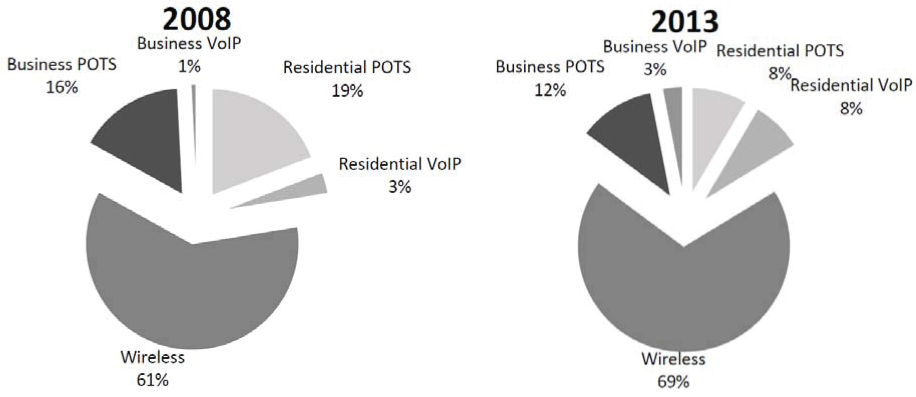
In a refreshingly honest, lay-your-cards-on-the-table move, AT&T told the California Public Utilities Commission that it shouldn’t bother investigating the condition of wireline phone systems in the state, because…
The number of wireline customers is now a small fraction of the Communications market. As of 2013, wireline customers made up only 20% of the market…Just five years prior, the wireline market was 35%.
Thus, not only is the wireline share very small, it is falling precipitously. About 70% of calls to 911 come from wireless phones, reflecting their dominance in the market. It makes no sense to set service quality metrics, adopt penalties, or audit the wireline networks when they serve such a small and diminishing share of the market.
Translation: the faster the copper rots on the poles, the faster customers will switch to more profitable and less regulated cellular service. Don’t spoil it for us.
That’s where the candor ends, though. The pie charts AT&T offered as proof (see above) are at best completely disingenuous and at worst a bald faced attempt to deceive. The key word is “customers”. Not households or, more broadly, premises, which are the usual measures for wireline service. So a home with one landline and four people, each with a mobile phone, comprises one wireline customer and four wireless customers. Apples and oranges.
The charts were derived from FCC reports released in 2010 and 2014 (and referenced in AT&T’s comments via broken links – good ones are below). Both reports carefully distinguish between “end-user switched assess lines” – i.e. landline phone connections – and “mobile wireless subscriptions”, and then warn…
We emphasize that the presentation of mobile wireless telephone subscriber counts in…this report does not [constitute], or imply, Commission analysis of the extent to which wireline and mobile wireless telephone services are demand substitutes or complements in general or in any particular situation.
AT&T also seems to have forgotten to mention the essential role that copper plays in delivering fast, reliable and cheap broadband service, at least in comparison to mobile technologies.
Verizon and AT&T want the CPUC to spike an investigation into the state of their copper phone networks. CPUC president Michael Picker wants to oblige them. At least two other commissioners – Mike Florio and Catherine Sandoval – are pushing to speed up the enquiry instead. A vote is scheduled for 13 August 2015.
Local Telephone Competition: Status as of December 31, 2008 (released June 2010).
Local Telephone Competition: Status as of December 31, 2013 (released October 2014).
